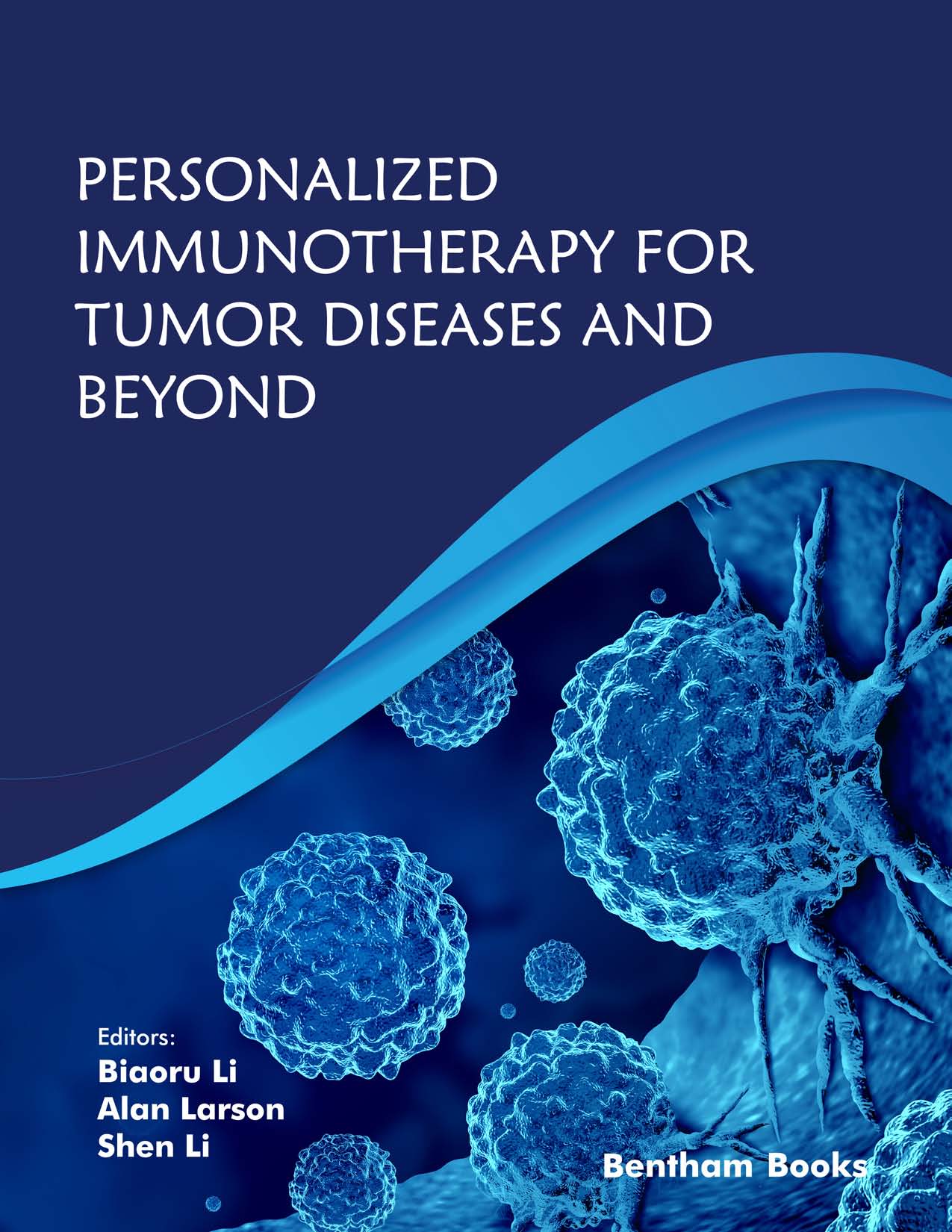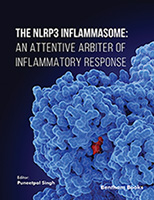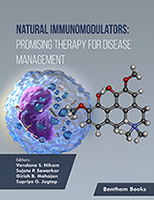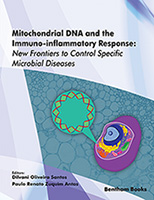T-cell adoptive immunotherapy for tumor diseases has been studied for nearly three decades. Steven Rosenberg was a pioneer in the successful use of tumor-infiltrating lymphocytes (TIL) in treating tumor diseases. In 1986, he first discovered that TIL could recognize autologous tumor cells. In 1988, he successfully applied autologous TIL to metastatic melanoma. Since 1989, we have used T-cell adoptive immunotherapy to treat more than 200 cases and published more than 50 papers. T-cell adoptive immunotherapy, along with its newer generation techniques, can be increasingly used to treat various solid tumor diseases such as ovarian, brain, lung, and liver cancers. Before introducing the preface, I will first review T-cell adoptive immunotherapy in three stages to summarize the thirty-year development of T-cell adoptive immunotherapy: (I) the early stages of T-cell adoptive immunotherapy such as TIL adoptive immunotherapy; (II) research and development (R& D) of a new generation of T-cell adoptive immunotherapy; and (III) clinical trials of the next-generation T-cell adoptive immunotherapy.
Early period R& D of T-cell adoptive immunotherapy:
After 1987, Dr. Rosenberg discovered that TILs could be cultured with the aid of the cytokine IL-2 and induced TIL exhibited cytotoxic activity against melanoma cells in vitro. TILs isolated from tumor samples were the earliest trials of ACT conducted at the surgical branch of the National Cancer Institute (NCI) in 1988. At the time, objective responses were observed in patients with metastatic melanoma. For the optimal procedure of TIL isolation and proliferation, we carefully studied the NCI protocol and then modified the protocol to establish a new TIL culture and proliferation procedure. Our earliest findings showed that the modified procedures are different from the NCI conventional approaches: (1) enzyme digestion of tumor tissue can result in loss of the signaling of T-cell so that only collagenase IV digestion can keep signaling intactness of T-cell and (2) adding process with a cleaning inhibiting factors and inhibiting cells will increase TIL activity and cytotoxicity to tumors, now the inhibiting factors, inhibiting cells and tissue called as tumor microenvironment (TME) after thirty years. After establishing the modified method, we also routinely employ TIL measurement by the proliferation and cytotoxicity assay since TIL efficacy is variable from a solid tumor. Although TILs effectively used for solid tumor have been debated more than 30 years, a few laboratories have reported that TILs have also been successfully applied to different solid tumors, such as pancreatic cancer, head, and neck cancer, lung cancer, brain cancer and liver cancer under the optimal culture procedures and right therapeutic conditions.
In the early phase of T-cell adoptive immunotherapy, three major breakthroughs were developed to increase TIL efficacy: (I) cytokines induction with IL-2 and IL-12; IL-2 and Anti-CD3 and IL-2 and Anti-CD3/CD28 for their cultures; (II) clinical TIL application combined with chemotherapy or lymphodepletion prior to adoptive cell therapy (ACT); (III) development of TIL location administration. These developments demonstrated the significant benefits in the early TIL clinical application (selected publications from our work as below).
R&D of a new generation of T-cell adoptive immunotherapy: With the maturation of gene transfer technology, three areas developed rapidly:
the affinity of T cells to tumor cells, such as (I) TCR T-cells (T-cell receptor engineered T-cell) and CAR T-cells (chimeric antigen receptor T-cell) related to the reconstructs of the signal structure of TCR molecules; (II) T-cell editing technology; (III) polyclonal TIL combined with a single T-cell genome linking new compounds to improve the efficacy of personalized immunotherapy. TCR T-cells and CAR T-cells on T-cell adoptive immunology have been studied for more than 30 years. Chimeric TCR that achieves T-cell specific affinity was first reported in 1989 by cloning anti-TNP mRNA into TCR V and C chain targeting cells. Since 1989, we had also tried DHBsAb (Duck Hepatitis B virus surface antibody) from duck to clone into human CD3 in TIL to form DHBsAb-CD3 CAR-T cells to treat hepatocellular carcinoma under the guidance of Dr. Shen (Picture A), who was my mentor when I was a graduate MD student thirty-five years ago). That time, DHBsAb-CD3 chimeric TIL failed to treat DHBV and HBV HCC cells due to limited knowledge of the early CD3 and TCR structures. Later, Irving and Weiss discovered that CD8 and CD3ζ chains could independently mediate T-cell activation of endogenous TCR; thus, CARs can be reconstructed as an extracellular domain for tumor antigen recognition as well as multiple intracellular signaling domains that mediate T-cell activation. Currently, third-generation chimeric receptors with CD28/4-1BB/CD3ζ can be used to treat chronic lymphocytic leukemia (CLL) with clinical significance. After decoding the TCR signaling protein, we have found that TCRs rely on the patient's human leukocyte antigen (HLA) allele, allowing for class I peptide-MHC binding, and ultimately cancer cell destruction. At present, TCR T-cells are successfully used in solid tumors. Molecular screening techniques of shared or specific tumor antigen/peptides play an essential role in personalized T-cell immunotherapy. We had initiated a phage-display screening system for specific peptides on malignant myeloid cells under the support of Drs. HD. Preisler and G Smiths in 1996 (Picture B). After more than 20 years of work, we have set up single-cell techniques, either supporting the specific targeting screening or a new generation T-cell adoptive immunotherapy based on single T-cell genomic profiles. The personalized immunotherapy based on genomics and GWAS from individual T-cell genomic profiles linking to a network and then further linking to the new compounds can be safely and effectively applied to personalized immunotherapy for different patients (selected publications from our work as below).
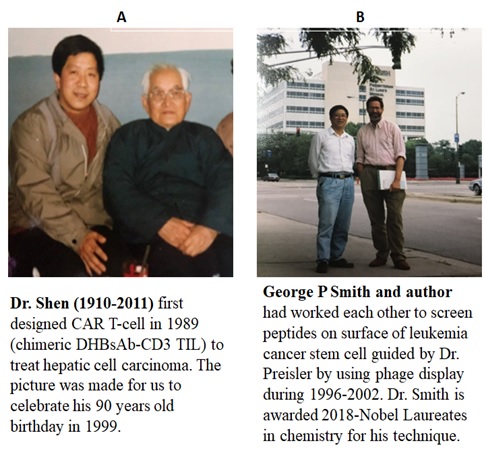
Clinical trials of the new generation of T-cell adoptive immunotherapy:
Since CAR T-cells have been proven to be effective in treating B-cell hematological malignancies, there are now more than 300 clinical trials on treating hematological malignancies through CAR T-cells. TCR T-cells have been increasingly reported for the treatment of solid tumors. Also, the medical industry is also advancing research on different stages of CAR T-cells and TCR T-cells for various tumor diseases (selected publications as below).
Biaoru Li
Georgia Cancer Center and Department of Pediatrics
Medical College at GA
Augusta
USA
Preamble and Contents
After nearly 30 years of developing T-cell adoptive immunotherapy as summarized above, our book will focus on personalized immunotherapy, a new strategy for cancer treatment in the 21st century. Personalized immunotherapy will involve a set of biochemical, immune, and genomic characterization of the tumors using multi-dimensional analyses in order to lead to an optimal decision on the appropriate immune treatment. Therefore, this book on personalized immunotherapy will first introduce some foundational concepts: MHC research and development, the genomic profiles and genome-wide association study (GWAS) of T-cells and tumor cells from patients, and technologies which provide the basis of personalized immunotherapy. The knowledge has led to the rapid development of personalized immunotherapy in the past decades.
Because recent research in personalized immunotherapy involves targeting therapy, in the book, we will introduce some new immunoassay methods related to personalized immunotherapy. Subsequently, we will present targeting immunotherapy in two chapters: personalized immunotherapies that depend on the tumor immune microenvironment (TIME) (such as PD1 or PDL1-related checkpoint targeted therapy) and immunotherapy dependent on the tumor microenvironment (TME) including IDO (indoleamine 2,3-dioxygenase) inhibitors and ADO (CD39/CD73/adenosine) inhibitors.
The central portion of this book, consisting of eight chapters, is related to personalized T-cell immunotherapy, which includes the basics of personalized T-cell immunotherapy and the essentials of the latest developments in personalized T-cell immunotherapy. The former with three chapters consists of new molecular technologies such as T-cell screening and cloning of tumor neoantigens, a new generation of primary tumor cell culture for T-cell cloning, bioinformatics platform of T-cells and primary tumor cells. The latter or personalized T-cell adoptive immunotherapy with four chapters will present the development and future of adoptive T-cell immunotherapy; the development of T-cell gene therapy and T-cell genome editing; the affinity of transgenic T-cells to tumor cells such as CAR T-cells and TCR T-cells; and systematic modeling of polyclonal specific T-cells. Finally, we will present a biobank for personalized immunotherapy, which we have been studying for more than twenty years.
Personalized immunotherapy is a new immunotherapy model for studying individualized cancer therapy, which involves "providing the right immunotherapy for the right people at the right time." Due to the complexity of individual tumors and immune responses, traditional immunotherapy models have faced challenges. To address this, we have written the book on updated strategies for cancer immunotherapy.
Selected publications for our early period of T-cell adoptive immunotherapy
REFERENCES
[1] Li B. Shanqing Dong, Xiheng Zheng, Yumin Zu, Baoyu Wu and Deyuan Lu. A New Experimental
and Clinical Approach of Combining Usage of Highly Active Tumor-infiltrating Lymphocytes and
Highly Antitumor Drugs for the Advanced Malignant Tumor. Chinese Medical Journal 1994; 107(11):
803-7.
[PMID: 7867384]
[2] Li B, Shen D. Preliminary Study on the Resting Status of Tumor-infiltrating Lymphocytes. Chinese
Microbiology and Immunology 1994; 14(6): 399-402.
[3] Li Biaoru. Tong Shanqing; Hu Baoyu; Zhu Youming; Zhang Xiheng; Wu Jianhe; Lu Deyuan; Lu Jing;
Study on the effect of enzymatic digestion on the activity of tumor infiltrating lymphocytes; Journal of
Molecular Cell Biology 1994 01
[4] Li B. Tong Shanqing; Zhang Xiheng; Zhu Youming; Hu Baoyu; Lu Deyuan; Lu Jing; Gu Qinlong;
Research on TIL proliferation, phenotype and lethality of human malignant solid tumors Modern
Immunology199405.
[5] Li Biaoru. Tong Shanqing; Zhu Youming; Hu Baoyu; Zhang Xiheng; Lu Jing; Wu Jianhe; Hu
Hongliang; Shen Dinghong; Lu Deyuan; Establishment of a method for separation of tumor infiltrating
lymphocytes with high vitality; Journal of Immunology 1994 01
[6] Zhu Y, Zhang X. Biaoru Li; Hu Baoyu; Wu Jianhe; Tong Shanqing; Removal of tumor-doped tumor
cells in tumor infiltrating lymphocyte culture; Journal of Shanghai Jiaotong University Medical
Science Edition199502.
[7] Jian Tao, Zhang Guochi, Ding Jianqing, Zhang Xiheng. 7. Tao Jian, Zhang Guochi, Ding Jianqing,
Zhang Xiheng, Biaoru Li, Tong Shanqing, Experimental study of receptor-mediated TNFα gene
transfer, Journal of Shanghai Second Medical University, 2000, Vol.20, No.01.
[8] Li Biaoru. Xu Wei, Qian Guanxiang, Zhang Xiheng, Dong Shanqing, Chen Shishu, Methodology of
TNF gene transduction of tumor infiltrating lymphocytes, Journal of Shanghai Second Medical
University, 1995, Vol. 15 No. 3,
[9] Ding Jianqing, Qian Guanxiang. Xu Wei; Zhu Youming; Hu Liang; Hu Baoyu; Zhang Tengfei; Zhang
Xiheng; Xu Rongting; Tong Shanqing; Xu Weizhen; Lu Deyuan; Chen Shishu; A preliminary study of
tumor necrosis factor gene transduction of tumor infiltrating lymphocytes Application; Chinese
Journal of Cancer Biotherapy 1995 01,
[10] Wang JH, Tong SQ. Biaoru Li, Ding JQ, Hu BY, Zhu YM, Lu DY, Hua ZD, Lu J. Immunological
Character of TIL in Ovarian Carcinoma. Chin J Cancer Res 2000; 12(2): 99-104.
[http://dx.doi.org/10.1007/BF02983432]
[11] Gu Qinlong. 11. Gu Qinlong, Biaoru Li, Electron microscopic observation of human gastric cancer
TIL cells in vitro killing MKN45 gastric cancer cell lines, Journal of Shanghai Second Medical
University, 1995, Vol. 15 No. 4.
[12] Gu Qinlong, Lin Yanqi, Yin Haoran. Zhu Youming, Hu Baoyu; Phenotype and cytotoxic activity of
infiltrating lymphocytes in gastrointestinal tumors[J] Journal of Shanghai Second Medical
University;1996-03.
[13] Gu Qinlong, Lin Yanqi, Yin Haoran. Biaoru Li, Zhu Youming, Hu Baoyu; Preliminary study on
cryopreservation of tumor infiltrating lymphocytes. Journal of Immunology, 1995-04
[14] Deng Y, Gu Q. Biaoru Li; Zhang Xiheng; MTT colorimetric assay for LAK and TIL cell activity in
cord blood; Journal of Shanghai Jiaotong University Medical Science Edition199502.
[15] Hu Bingcheng, Li Guowen, Wei Cheng, Shen Jiankang, Dong Lin. Biaoru Li, Clinical application of
infiltrating lymphocytes in malignant brain tumors, Journal of Immunology, 1997-02
[16] Hua Zude, Jing Lu, Li Huifang. Zhu Youming; Tong Qingshan; Clinical study of tumor infiltrating
lymphocytes in ovarian cancer. Chinese Journal of Obstetrics and Gynecology 1996 09
[17] Li H, Jing L, Hua Z. Biaoru Li; Tong Shanqing; Lu Deyuan; Study on the killing activity of TIL cells
in ovarian cancer Shanghai Medical199505.
[18] Jing Lu. Hua Zude; Zhu Youming; Tong Shanqing; Research on TIL yield and vitality of different
materials; Journal of Immunology 1995 03
[19] Jing Lu, Hu Liewei, Hua Zude. Biaoru Li, Tong Shanqing; Analysis of the therapeutic effects of
different therapeutic approaches for TIL; 1996-02
[20] Jing L, Hua Z, Li H. Biaoru Li, Zhu Youming, Tong Shanqing; In vitro study of ovarian cancer TIL
Shanghai Medical Journal199506.J
[21] Jing L, Duan LD, Hua Z. Biaoru Li, Zhu Youming; Tong Shanqing; Preliminary observation of
biological characteristics of cord blood lymphocytes, Journal of Shanghai Jiaotong University Medical
Science Edition199501.
[22] Tong Shanqing, Wang Jianhua. Ding Jianqing; Hu Baoyu; Zhu Youming; Lu Deyuan; Hua Zude; Lu
Jing; Biological characteristics of invasive lymphocytes from ovarian cancer; Chinese Journal of
Immunology 2000 03
[23] Cai Xiaomin, Jing Lu, Hua Zude. Tong Shanqing; Clinical Application of TIL from Different Sources;
Journal of Immunology 1996 04
[24] Tong S, Wang J. Biaoru Li, Ding Jianqing; Hu Baoyu; Zhu Youming; Lu Deyuan; Hua Zude; Lu
Jing; Biological characteristics of invasive lymphocytes from ovarian cancer. Chin J Immunol 2000.

